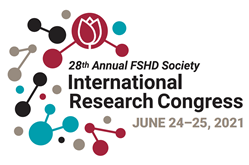
“This annual meeting has helped to bring the field to its current state, with more than a dozen biopharmaceutical companies and academic labs actively developing treatments.”
NORTH RANDOLPH, Mass. (PRWEB)
June 24, 2021
The FSHD Society announced the opening today of its 28th annual International Research Congress (IRC), which is being conducted entirely online. The two-day conference is the premier global platform for the discussion and dissemination of cutting-edge research on facioscapulohumeral muscular dystrophy (FSHD). More than 300 researchers, clinicians, industry representatives and patient advocates are attending.
This annual meeting, started in 1994, has catalyzed fundamental discoveries and helped to bring the field to its current state, with more than a dozen biopharmaceutical companies and academic labs actively developing treatments that target the root genetic cause of FSHD. The dominantly inherited condition, which affects around 1 in 8,000 people in the general population, causes muscle weakness and wasting, leading to significant disability.
The 2021 International Research Congress will include a highly awaited presentation by Fulcrum Therapeutics of the data from its ReDUX4 phase 2b clinical trial. The clinical trial is designed to evaluate the safety and efficacy of losmapimod, an investigational selective p38α/β MAPK inhibitor, in addressing the underlying cause of FSHD. ReDUX4 is the largest, most comprehensive global, multi-center, randomized placebo controlled clinical trial of FSHD to date. To conduct the trial, Fulcrum measured multiple clinical and patient-reported outcome assessments and broke new ground in the use of muscle biomarkers and whole body musculoskeletal magnetic resonance imaging as outcome measures, both areas that are of keen interest to all drug developers in this space.
The congress is also convening a panel to discuss antisense strategies to treat FSHD, with seven industry and academic speakers presenting various approaches to silencing the target gene, called DUX4, and delivering their candidate molecules into muscle safely at therapeutically relevant levels.
Keynote talks will highlight topics that promise to lead to important new insights and therapeutic targets. Russell Butterfield, MD PhD, of the University of Utah, will speak about an 80-year study of a large Utah kindred with hundreds of FSHD cases, which continues to provide insight into factors that influence the severity of disease symptoms. Stephen Tapscott, MD PhD, of the Fred Hutchinson Cancer Research Center, will address aspects of the immune response in FSHD, a subject that was largely overlooked until very recently.
A growing number of companies have sponsored the FSHD International Research Congress as they enter the field of FSHD diagnostics and therapy development. This year’s foundation and industry supporters include: AMRA, Armatus Bio, Arrowhead Pharmaceuticals, Association Français Contre les Myopathies, Avidity Biosciences, Bionano Genomics, Dyne Therapeutics, Facio Therapies, Fulcrum Therapeutics, Genomic Vision, miRecule, Muscular Dystrophy Association, National Institutes of Health, PerkinElmer Genomics, Ultragenyx, and the University of Nevada Reno.
“Although current circumstances prevent us from hosting an in-person meeting, we are delighted by the incredible number of researchers and clinicians who were able to advance the field during these challenging times,” said Jamshid Arjomand, PhD, chief science officer of the FSHD Society. “We are grateful for the tremendous support from our sponsors and families, without whom none of this would be possible.”
About the FSHD Society
The FSHD Society is the world’s largest research-focused patient advocacy organization for facioscapulohumeral muscular dystrophy (FSHD), one of the most prevalent forms of muscular dystrophy. The Society has catalyzed major advancements and is accelerating the development of treatments and a cure to end the pain, disability, and suffering endured by one million people worldwide who live with FSHD. The FSHD Society has transformed the landscape for FSHD research and is committed to making sure that no one faces this disease alone. The Society offers a community of support, news, and information through its website at https://www.fshdsociety.org.
Share article on social media or email:

